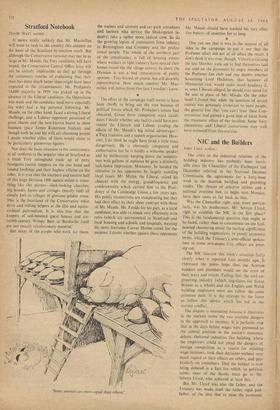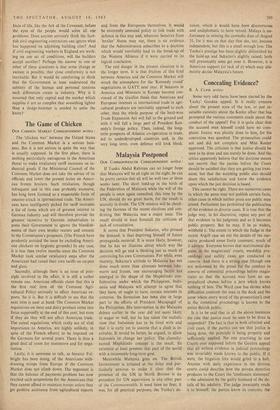NIC and the Builders
JOHN Coi The crisis in the industrial relations of the building industry has probably been inevit- able since the Chancellor of the Exchequer last December referred to the National Incomes Commission the agreements for a forty-hour week in the Scottish building and plumbing trades. The threats of .selective strikes and a national overtime ban, to begin next Monday, have their roots as far back as that.
Was the Chancellor right, and, more particu- larly. was his predecessor, Mr. Selwyn Lloyd, right to establish the 1‘1,1C in the first place? This is the fundamental question that ought to be faced, rather than to concentrate on the half- hearted chuntering about the tactical significance of the building negotiations,.in purely economic terms, which the Treasury's semi-official spokes- men in some newspaper City offices are pour- ing out.
The NIC foresaw this week's situation fairly clearly when it reported four months ago. It expressed the pious hope that the Scottish builders and plumbers would see the error of their ways and recant. Failing that, the civil en- gineering industry (which negotiates for Great Britain as a whole) and the English and Welsh building employers must not follow the same primrose path. It is the attempt by the latter to follow this advice which has led to the current conflict.
The dispute is interesting because it illustrates in the starkest terms the two extreme dangers in the approach to incomes. It is perfectly true that in the days before wages were promoted to the central position in the nation's economic debate, sheltered industries like building, where the employers could not plead the dangers of foreign competition as a reason for resisting wage increases, took their decisions without very much regard to their effects on others, and par- ticularly on consumers. That the subject is now being debated is a fact for which, in political terms, most of the thanks must go to Mr. Selwyn Lloyd, who achieved at least this.
But Mr. Lloyd was also the father, and the Treasury has made, itself the rather rigid god- father, of the idea that to raise the economic facts of life, like the Ark of the Covenant, before the eyes of the people would solve all our problems. Does anyone seriously think the Scot- tish civil engineering contractors can ignore what has happened on adjoining building sites? And if civil engineering workers in England are work- ing on one set of conditions, will the builders accept another? Perhaps the answer to one or other of these questions is that some change or variant is possible, that close conformity is not inevitable. But it would be comforting to think that the Government at least understood the subtlety of the human and personal tensions such differences create in industry. Why is it assumed that only capital and the market which supplies it are so complex that something lighter than a sledge-hammer is needed to untie the knots?































 Previous page
Previous page